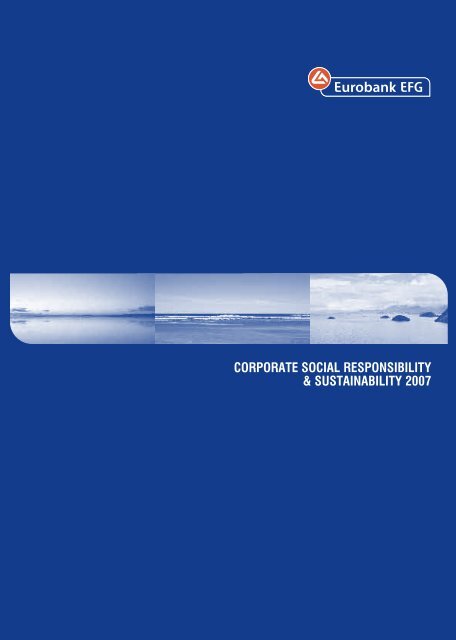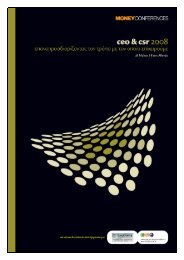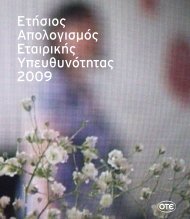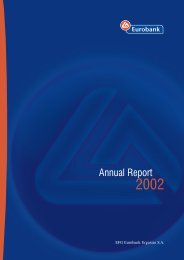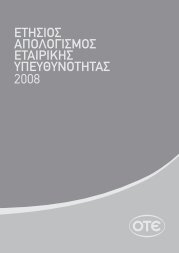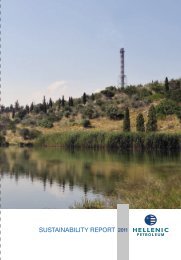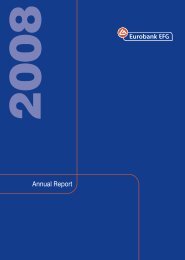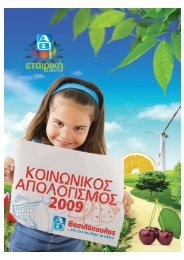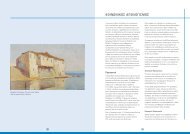EFG Eurobank Ergasias S.A. Corporate Social ... - EuroCharity
EFG Eurobank Ergasias S.A. Corporate Social ... - EuroCharity
EFG Eurobank Ergasias S.A. Corporate Social ... - EuroCharity
Create successful ePaper yourself
Turn your PDF publications into a flip-book with our unique Google optimized e-Paper software.
CORPORATE SOCIAL RESPONSIBILITY<br />
& SUSTAINABILITY 2007
2<br />
The <strong>Eurobank</strong> <strong>EFG</strong> Group<br />
196<br />
Group Net Profits (x m.)<br />
273 340 501<br />
644<br />
851<br />
TARGET<br />
1,030<br />
2002 2003 2004 2005 2006 2007 2008<br />
687<br />
2003<br />
Client Servicing Units<br />
713<br />
868<br />
1,312<br />
1,523<br />
2004 2005 2006 2007<br />
145<br />
2002<br />
13,393 13,720<br />
2003<br />
Total Dividend (x m.)<br />
185<br />
2003<br />
CAGR 24%<br />
226<br />
2004<br />
Employees<br />
16,201<br />
286<br />
2005<br />
21,5%<br />
350<br />
2006<br />
17,866<br />
425<br />
2007<br />
22,109<br />
2004 2005 2006 2007
The <strong>Eurobank</strong> <strong>EFG</strong> Group is an international banking organization with a workforce of more than 22,000<br />
people, which offers its products and services in 10 countries, through more than 1,500 branches and<br />
points-of-sale.<br />
The Group was established in 1990, and is a member of the Geneva-based European Financial Group.<br />
With regulatory capital of x5.7 billion by the end of 2007, <strong>Eurobank</strong> <strong>EFG</strong> is a key player in the banking<br />
sectors of the countries where it operates. More specifically, in the past few years the Group has deployed<br />
major operations in Bulgaria, Romania, Serbia, Poland, Turkey and Ukraine, while in 2007 it established its<br />
presence in Cyprus.<br />
In Greece, the <strong>Eurobank</strong> <strong>EFG</strong> Group has become the leader in consumer credit, mutual funds, investment<br />
banking, equity brokerage and life insurance, while it is the largest lender of small Greek enterprises, and<br />
one of the largest lenders of Greek private sector companies.<br />
<strong>Eurobank</strong> <strong>EFG</strong> owes its success to its innovative and high-quality products, its lead regarding alternative<br />
distribution channels, and the provision of customized services to its clients. These competitive edges<br />
have been gained with the support of state-of-the-art infrastructure, in which the Bank has made substantial<br />
investments, but mainly, through the supremacy of its people in terms of know-how and skills.<br />
Shareholders<br />
The ultimate parent company of the <strong>Eurobank</strong> <strong>EFG</strong> Group is the <strong>EFG</strong> Group owned by Latsis family<br />
interests, which on 31.12.07 controlled 41% of its shares. The majority of shares are widely dispersed,<br />
among more than 210,000 private and institutional investors.<br />
Objectives<br />
• To establish <strong>Eurobank</strong> <strong>EFG</strong> as the Bank of choice in Greece, emphasizing on quality, innovation and<br />
comprehensive service;<br />
• To expand the Bank's presence in the greater region of New Europe, through the implementation of its<br />
successful domestic business model abroad.<br />
CORPORATE SOCIAL RESPONSIBILITY & SUSTAINABILITY 2007<br />
3
4<br />
Contents
INTRODUCTION 7<br />
Vision & Values<br />
Our 2007 Calendar of <strong>Social</strong> Responsibility<br />
Distinctions for the <strong>Eurobank</strong> <strong>EFG</strong> Group<br />
<strong>Corporate</strong> <strong>Social</strong> Responsibility as part of our Strategy<br />
THE STAKEHOLDERS:<br />
HUMAN RESOURCES 13<br />
Employment<br />
Selection of Employees<br />
Training<br />
Employee Development<br />
The Performance Management System<br />
The Compensation and Benefits Policy<br />
Internal Communication<br />
The Contribution of Human Resources Sector to the Group’s International Activities<br />
SHAREHOLDERS 25<br />
CLIENTS AND SUPPLIERS 26<br />
SOCIAL CONTRIBUTION 29<br />
Charities<br />
Education<br />
Culture<br />
Sports<br />
The Environment<br />
<strong>Social</strong> Contribution Abroad<br />
CORPORATE SOCIAL RESPONSIBILITY & SUSTAINABILITY 2007<br />
5
anew era<br />
of<br />
social responsibility
8<br />
Vision & Values<br />
The <strong>Eurobank</strong> <strong>EFG</strong> Group has based its existence and leadership on one vision: “To be the Bank of first choice in<br />
the region of New Europe, while operating with a sense of responsibility towards its employees, its customers,<br />
its shareholders and the society.”<br />
Beyond the vision that guides the daily activity of the <strong>Eurobank</strong> <strong>EFG</strong> Group, its dynamic growth is based on a<br />
number of values:<br />
Meritocracy<br />
We offer equal opportunities to and ensure the equal treatment of all our employees. We recognize improvement<br />
in performance and reward employees on the basis of their individual and collective achievements.<br />
Team Work<br />
We value team work and the collective effort for corporate success.<br />
Quality<br />
We work constantly in order to deliver a high level of quality in our products and services.<br />
Trust<br />
We create trust in our relationships by acting in a reliable manner. Therefore, our clients can depend on our staff<br />
and services.<br />
Efficiency<br />
We seek to achieve our goals through thorough planning and we always aim for the best possible results in what<br />
we engage in.<br />
Creativity<br />
We constantly strive for innovation and seek to introduce new ideas in order to improve our level of products and<br />
services.<br />
Respect for People<br />
We always act with understanding and respect for the needs of our clients, our colleagues and our fellow<br />
citizens.<br />
<strong>Social</strong> Contribution<br />
We contribute, with all possible means, to the local communities in which we operate. Our contribution reflects<br />
the anthropocentric nature of our organization and the values of our shareholders.
Our 2007 Calendar of <strong>Social</strong> Responsibility<br />
January: The Group renewed its sponsorship to the KAMERATA up to 2009, laying the foundation for a<br />
long-term collaboration over the last 15 years.<br />
February: His Excellency, the President of the Republic of Greece, Mr. Carolos Papoulias, awarded the<br />
“best of the best” high school graduates of the 2005-2006 season, as part of the “Great Moment for<br />
Education” programme.<br />
April: Bestowal of awards to top-ranking graduates of the School of Fine Arts, as part of the “Great<br />
Moment for Culture: Promoting Young Artists” programme.<br />
May: <strong>Eurobank</strong> Family Day, with the participation of 12,000 employees and their families, at the “Allou<br />
Fun Park” entertainment centre, in Athens.<br />
June: Bestowal of awards to <strong>Eurobank</strong> <strong>EFG</strong> Group employees, as part of the reward and recognition<br />
program for employees with a long-standing contribution to the Bank’s growth.<br />
August: The John S. Latsis Public Benefit Foundation and <strong>Eurobank</strong> <strong>EFG</strong> announce a x60 million program<br />
for the support of fire-stricken citizens and regions.<br />
September: The Greek Men’s National Basketball Team, sponsored by <strong>Eurobank</strong> <strong>EFG</strong>, captures the fourth<br />
place at the European Championship, held in Madrid.<br />
Wholesale Banking employees donate a playground to the “MITERA Infants Centre”.<br />
October: The Group becomes the sponsor of the “Neuropsychological Rehabilitation Program for Brain<br />
Injured People”, a new pilot programme of the Hellenic Society for Disabled Children (ELEPAP), in honour<br />
of the Group’s executive, Mr. George Alvertis.<br />
November: Distinction for the “Learn, Participate, Protect Mount Parnes National Forest” environmental<br />
programme of <strong>Eurobank</strong> <strong>EFG</strong> at the Marketplace ΙΙΙ of CSR Europe, in Brussels.<br />
December: Members of the Greek Men's National Basketball Team visit the “Aghia Sophia” children’s<br />
hospital and the “Hatzikyriakio Child Care Institution” as part of the Christmas initiatives undertaken by the<br />
<strong>Eurobank</strong> <strong>EFG</strong> Group.<br />
CORPORATE SOCIAL RESPONSIBILITY & SUSTAINABILITY 2007<br />
9
10<br />
Distinctions for the <strong>Eurobank</strong> <strong>EFG</strong> Group<br />
The year 2007 was another year resplendent with distinctions for the <strong>Eurobank</strong> <strong>EFG</strong>. In fact, many of<br />
these distinctions have been bestowed to the Group quite a few times in the past, attesting to its consistent<br />
and sustained efforts to provide quality, innovation and full service, always focusing on the customer.<br />
• “Bank of the Year 2007” in Greece by the Financial Times’ magazine, The Banker.<br />
• “Best Bank in Greece 2007” by the Global Finance magazine.<br />
• “Best Bank in Greece 2007 in Private Banking” by the Euromoney magazine.<br />
• <strong>Eurobank</strong> Securities was ranked first among Greek securities firms by the<br />
London-based independent house “AQ Research” for the accuracy<br />
of its stock analyses.<br />
• “Best Domestic Custodian” in Greece by the Global Finance magazine and “Top<br />
Rated” Domestic Custodian for Greek and foreign institutional investors, as well as<br />
for large foreign institutional investors by the Global Custodian magazine.<br />
• Best Consumer e-Bank in Greece for 2007 by the Global Finance magazine.<br />
• Twelve mutual funds, offered by the <strong>EFG</strong> Mutual Fund Management Company, were<br />
distinguished during the year by the Morningstar® and Standard & Poor’s<br />
international rating agencies.<br />
• In Romania, Bancpost was named the “Best Managed Bank in Central & Eastern<br />
Europe 2007” by the Euromoney magazine.<br />
• Bancpost was also named “Bank of the Year 2007" by the Bucharest Business Week<br />
magazine.<br />
• <strong>EFG</strong> <strong>Eurobank</strong> Leasing was named “Best Leasing Company” in Romania for 2007 by<br />
the Piata Financiara magazine.<br />
• <strong>Eurobank</strong> <strong>EFG</strong> Štedionica received the “Golden Seal” of the Landscape Architects<br />
Association of Serbia for its contribution to ecology and environmental protection.
<strong>Corporate</strong> <strong>Social</strong> Responsibility as part of our Strategy<br />
Sustainability has been recognized by most organizations as a source of competitive advantage, as well<br />
as a profitability and growth driver. Thus, the <strong>Corporate</strong> <strong>Social</strong> Responsibility strategy pursued by the<br />
<strong>Eurobank</strong> <strong>EFG</strong> Group acknowledges that the growth and prosperity of the organization are founded on the<br />
company’s responsible stance and actual behaviour towards the society and especially towards its<br />
stakeholders. The stakeholders are fashioning the environment in which <strong>Eurobank</strong> <strong>EFG</strong> operates and<br />
grows; therefore the protection and viability of this environment are crucial for the organization’s very<br />
existence.<br />
Employees: The <strong>Eurobank</strong> <strong>EFG</strong> Group employs more than 22,000 people in Greece and abroad.<br />
The Group’s strategy aims at the creation and maintenance of a professional environment that fosters and<br />
rewards initiative and efficiency.<br />
Shareholders: The Group’s strategy is based on a spirit of continuous efficiency improvement, with the<br />
aim of generating added shareholder value.<br />
Clients: The Group’s clients are its foundation and the main prerequisite for its future success.<br />
The strategy implemented by <strong>Eurobank</strong> <strong>EFG</strong> is based on a client-oriented approach, which permeates all<br />
its activities.<br />
Suppliers: As far as suppliers are concerned, the <strong>Eurobank</strong> <strong>EFG</strong> Group has established and applies a<br />
consistent procurement procedure, seeking to ensure meritocracy and quality.<br />
Society: Once more, the <strong>Eurobank</strong> <strong>EFG</strong> Group continued to support the fields of Education, Culture, Sports<br />
and the Environment, embracing, at the same time, a series of foundations and organizations whose<br />
activity was encouraged through the sponsorship of specific initiatives. In particular, though, in 2007<br />
<strong>Eurobank</strong> <strong>EFG</strong> and the John S. Latsis Public Benefit Foundation stood by the citizens that were afflicted<br />
from August’s devastating wildfires. The two organizations announced a program comprising specific<br />
targets and actions, which began in 2007 and will be continued in 2008, in an effort to support both the<br />
fire-stricken citizens, and the regions that were mostly devastated.<br />
Thanks to its work on <strong>Corporate</strong> <strong>Social</strong> Responsibility issues, the share of <strong>Eurobank</strong> <strong>EFG</strong> has been<br />
included for a seventh consecutive year in the FTSE4Good Europe and FTSE4Good World indices, which<br />
comprise companies adhering to a series of strict criteria concerning environmental, stakeholder consultation<br />
and co-operation, as well as human rights protection issues.<br />
CORPORATE SOCIAL RESPONSIBILITY & SUSTAINABILITY 2007<br />
11
anew era<br />
of<br />
personal advancement
14<br />
Stakeholders<br />
Employees<br />
The dynamic growth and the leading position of the <strong>Eurobank</strong> <strong>EFG</strong> Group are due to the<br />
innovative nature and the quality of its products, its lead regarding alternative distribution<br />
channels, and the provision of customized services to its clients. These competitive<br />
edges have been gained with the support of state-of-the-art technological infrastructure<br />
but, mainly, through the supremacy of the Group’s people in terms of know-how and<br />
skills.<br />
Since its very inception, <strong>Eurobank</strong> <strong>EFG</strong> has been committed to elevate and utilize its<br />
human resources, by implementing advanced selection, training, evaluation and reward<br />
methods, fully aware that its most valuable asset, which adds value to its activity, is its<br />
people. Therefore, the Group attached great importance to:<br />
• the proper coverage of job vacancies by means of unimpeachable systems, based on<br />
meritocracy and aiming at the selection and evaluation of the required knowledge and<br />
skills on each field of work;<br />
• the provision of equal learning and career advancement opportunities<br />
to all employees;<br />
• the cultivation of an environment that constantly recognizes and rewards effort,<br />
always in accordance with the principles and values that govern the Organization.<br />
Employment<br />
<strong>Eurobank</strong> <strong>EFG</strong> has expanded by means of both strong organic growth, and mergers and<br />
acquisitions, and today is one of the key players in the most rapidly growing and<br />
profitable sectors of the banking market.<br />
In 2007, both the Bank and the Group’s subsidiaries registered another year of strong<br />
growth in Greece and the wider region of New Europe. These fast growth rates are<br />
reflected on the data concerning the development of the Group’s Human Resources. On<br />
31.12.2007, the Group employed 22,109 people, as compared with 17,866 in the same<br />
period of 2006.<br />
In New Europe, the Bank sustained its dynamic expansion, with major operations in<br />
Bulgaria, Romania, Serbia, Poland, Turkey, Ukraine and Cyprus.<br />
It is worth noting that in 2007 the number of people employed abroad exceeded for the<br />
first time the number of people working in Greece, accounting, by the end of the year,<br />
Other<br />
Countries<br />
Turkey<br />
Ukraine<br />
Poland<br />
Serbia<br />
Bulgaria<br />
Romania<br />
Greece<br />
for 53% of the Group’s total workforce. 0<br />
25,000<br />
20,000<br />
15,000<br />
10,000<br />
5,000<br />
0<br />
Evolution of Employment in the Group<br />
2003 2004 2005 2006 2007<br />
Bank 31/12<br />
Group 31/12<br />
Employees per Country<br />
1,000<br />
2,000<br />
3,000<br />
4,000<br />
5,000<br />
6,000<br />
7,000<br />
8,000<br />
9,000<br />
10,000<br />
11,000
As a rule, the Group’s member-companies are among the leaders of their respective<br />
market segments, offering major competitive advantages as far as client service is<br />
concerned. In terms of human resource management, this translates into the ongoing<br />
development of skills and competencies, and the provision of major career opportunities<br />
in the field of financial services in Greece, and in the countries of South-eastern and<br />
Central Europe where the Group has established its presence.<br />
Almost 80% of the employees are less than 45 years old, while the average age of the<br />
workforce for the year 2007 stood at 37 years. Gender distribution is rather balanced, as<br />
women accounted for 49.4% of the total workforce, bearing excellent proof of the equal<br />
opportunities policy implemented by the Group.<br />
Most of the people employed in Greece are located in the region of Attica, whilst, based<br />
on the nature of the Group’s operations, their majority is deployed in front line Units,<br />
mainly in the Branch Network and the Business Centres.<br />
The next sections examine the policies and practices implemented in the following fields:<br />
• Selection of employees<br />
• Training<br />
• Performance management system<br />
• Compensation and benefits<br />
• Internal communication<br />
1,300<br />
1,100<br />
900<br />
700<br />
500<br />
300<br />
100<br />
CORPORATE SOCIAL RESPONSIBILITY & SUSTAINABILITY 2007<br />
16<br />
Selection of Employees<br />
The Bank believes that the attraction, evaluation and assimilation of new employees are<br />
the beginning of a long-term and mutually beneficial relationship.<br />
Therefore, in order to fully cover its staffing requirements, the Bank is always seeking<br />
candidates that possess up to date expertise, dynamism and team spirit, and are<br />
committed to the continuous development of their knowledge, skills, and professional<br />
profile. The Bank offers a large number of new and demanding job positions, over a<br />
wide range of activities that present increased professional career opportunities. In this<br />
respect, after evaluating 9,000 candidates in 2007, the Bank hired a total of 1,015<br />
people, a 72% increase from 2006, which attests to its strong growth and establishes<br />
<strong>Eurobank</strong> <strong>EFG</strong> as one of the largest employers in the Greek labour market.<br />
More specifically, 71% of new hires were absorbed by the Customer Service Networks,<br />
which include the Retail Banking, <strong>Corporate</strong> Banking and Private Banking networks,<br />
while great emphasis was placed on the staffing of 33 new branches in Athens and the<br />
rest of Greece, which strengthened the Bank's presence in the domestic banking market.<br />
The Bank emphasizes on the integration, utilization and development of the skills of<br />
young people that show dynamism and professionalism and are poised to form the<br />
future generation of Group executives. The educational background of new hires<br />
continues to be rather high, since 95% are tertiary education graduates, while 42% are<br />
holders of postgraduate degrees.<br />
The recognition of the <strong>Eurobank</strong> <strong>EFG</strong> Group as an “employer of first choice” in the labor<br />
market is corroborated by the continuous increase in the number of curricula submitted<br />
in recent years. The total number of curricula submitted during 2007 amounted to<br />
16,000, a 20% increase from 2006. It should be noted that 80% of the curricula<br />
concerned university graduates.<br />
Moreover, the Bank realized targeted programmes for attracting candidates with remarkable<br />
academic backgrounds. This was the backdrop for organizing the highly successful<br />
“Meet the Best” one-day conference, for a second year in a row.<br />
In addition, the Bank maintained its systematic contact with highly recognizable Universities<br />
in Greece and abroad, and continued to offer hands-on training courses that<br />
enable graduates to put their academic knowledge to practice.<br />
Placing special emphasis on objectivity and meritocracy, the personnel selection<br />
procedure is based on predetermined criteria, fully aligned with <strong>Eurobank</strong> <strong>EFG</strong>’s values<br />
and vision. These criteria are applied in written assessments, structured interviews,<br />
psychometric methods and assessment centres, methods and practices that are<br />
constantly updated and improved, with the aim of achieving a documented outline of the<br />
applicants’ profiles. It should be noted that the personnel selection procedure has<br />
received the ISO 9001 certification by the British Standards Institute and is carried out by<br />
properly trained and specialized executives.<br />
University<br />
Graduate (ΑΕΙ)<br />
43%<br />
Branch Network<br />
Central Functions<br />
Business Centers<br />
Employee Distribution<br />
per Function<br />
40%<br />
6%<br />
54%<br />
Work Experience of new Recruits<br />
at the Bank<br />
Less than<br />
2 years<br />
69%<br />
2 to 5 years<br />
16%<br />
Educational Level of New Recruits<br />
at the Bank<br />
Master 41%<br />
More than 5 years<br />
15%<br />
Technical<br />
Schools (ΤΕΙ)<br />
10%<br />
High School 5%<br />
PhD 1%
Training<br />
The Bank believes in, and supports, the continuous systematic upgrading of its people's<br />
skills, through its training programmes and initiatives.<br />
In <strong>Eurobank</strong> <strong>EFG</strong>, training is addressed to all personnel and enables employees to keep<br />
up with issues directly related to their work in order to improve their knowledge, preparing<br />
them to assume increased responsibilities, and occupy higher hierarchical posts.<br />
The training plan implemented in 2007, through procedures certified in accordance with<br />
the ISO 9001 standard, includes training programs that cover a wide range of subjects,<br />
combining modern educational methods.<br />
The training courses include:<br />
New Employee Training Program<br />
The immediate and smooth adaptation of newly-hired employees to their new working<br />
environment is a primary concern of the Bank.<br />
These programs familiarize participants with the structure and philosophy of the Organization,<br />
the Greek financial system and the products and services offered by the Bank.<br />
Moreover, the structure of the programmes combines 7,200 modern training methods,<br />
such as “e-learning” and “on the job training”, designed to combine theoretical training<br />
with working experience.<br />
<strong>Eurobank</strong> – INSEAD Leadership Development Program<br />
Firmly believing that efficient leadership practices provide the Organization with strategic<br />
importance and competitive advantages, in 2007 the Bank realized its “Leadership<br />
Development Program” in cooperation with INSEAD, the internationally acclaimed<br />
training organization. This is a training course that revolutionizes Greek banking practice,<br />
and has been designed in accordance with the Organization’s requirements and<br />
strategy.<br />
The course is addressed to the Bank’s senior executives, lasts 9 days and includes three<br />
different sections. The course is taught by distinguished INSEAD professors, who<br />
introduce pioneering training methods, such as the 360° process feedback, topical<br />
case-studies and effective group workshops, while participants are given the opportunity<br />
to delve into hands-on knowledge and tools that will help them develop their leadership<br />
skills.<br />
In-House MBA in Financial Services<br />
In 2002, <strong>Eurobank</strong> <strong>EFG</strong> introduced an innovative internal MBA program, the “In-House<br />
<strong>Eurobank</strong> <strong>EFG</strong> – ALBA MBA” in collaboration with the Athens Laboratory of Business<br />
Administration (ALBA). The duration of the program is two years and the faculty<br />
includes eminent professors from internationally acclaimed business schools, such as<br />
Harvard, INSEAD, and the University of New York.<br />
20-30 31-35 36-40 41-50 51+<br />
CORPORATE SOCIAL RESPONSIBILITY & SUSTAINABILITY 2007<br />
Cost xm.<br />
600<br />
400<br />
200<br />
0<br />
3.4<br />
2.9<br />
2.4<br />
1.9<br />
1.4<br />
0.9<br />
0.4<br />
0.1<br />
7,800<br />
7,600<br />
7,400<br />
7,200<br />
7,000<br />
6,800<br />
6,600<br />
New Recruits at the Bank<br />
(Per Gender and Age)<br />
Men Women<br />
Training Costs and Man-hours<br />
2003 2004 2005 2006 2007<br />
Total Man-hours Total Cost<br />
Trained to Total Bank Employees<br />
54.4 62.3<br />
69.9 69.9<br />
68.9<br />
2003 2004 2005 2006 2007<br />
240,000<br />
220,000<br />
200,000<br />
180,000<br />
160,000<br />
140,000<br />
120,000<br />
100,000<br />
80,000<br />
60,000<br />
40,000<br />
20,000<br />
0<br />
6,400<br />
10<br />
6,200 0<br />
Employees % of trained employees<br />
80<br />
70<br />
60<br />
50<br />
40<br />
30<br />
20<br />
17<br />
Man-hours
18<br />
The year 2007 saw the continuation of the third round of the programme in Athens and<br />
the beginning of the fourth round in Thessaloniki, with the purpose of offering career<br />
development opportunities to Bank executives located in Northern Greece. The third and<br />
fourth rounds of the programme are attended by 52 participants, while 114 Bank<br />
executives have attended the programme till this date.<br />
Business Administration Course<br />
In 2007, the Bank joined forces with the Athens University of Economics in order to<br />
design and materialize the “Business Administration” Programme. The programme<br />
focuses on improving leadership skills and developing a common business and strategic<br />
perception among participants. The programme lasts 300 hours and is addressed to<br />
Branch Network managers.<br />
Certification Programs<br />
Adhering to the guidelines issued by the Bank of Greece regarding the professional<br />
certification of market agents, in 2007 the Bank completed the certification course for<br />
the “Reception and Transmission of Orders” and initiated the professional certification<br />
course for the “Provision of Investment Advice”.<br />
Young Executives Program<br />
In 2007, <strong>Eurobank</strong> <strong>EFG</strong> launched the “Young Executives Program”, a pioneering development<br />
and training program for young employees. The program is addressed to both<br />
the external and internal job markets and enables high profile young professionals to lay<br />
the groundwork for a dynamic career with the Group, through job rotation, specialized<br />
training and mentoring.<br />
E-learning programs<br />
Supporting and implementing sophisticated training methods, <strong>Eurobank</strong> <strong>EFG</strong> started in<br />
2007 the development and realization of e-learning general banking courses. The same<br />
training methodology will be applied to programs on Physical Security, Health and<br />
Safety at Work, and the Environmental Management System.<br />
Participations in Training Programs<br />
at the Bank<br />
30,000<br />
25,000<br />
20,000<br />
15,000<br />
10,000<br />
5,000<br />
0<br />
2003 2004 2005 2006 2007<br />
Conferences 1.8%<br />
Sales 5.0%<br />
250,000<br />
200,000<br />
150,000<br />
100,000<br />
50,000<br />
0<br />
In- House<br />
External<br />
Total<br />
Participations per Training Subject (%)<br />
IT 15.8%<br />
Accounting<br />
& Tax 0.2%<br />
Training Hours and Man-hours<br />
129,226<br />
28,676<br />
153,764<br />
78,036<br />
188,447<br />
113,025<br />
2003 2004 2005 2006 2007<br />
In house training Man-hours<br />
Total Man-hours<br />
161,932<br />
92,067<br />
Banking 47.7%<br />
In House MBA<br />
(Alba) 0.2%<br />
Other Post Graduate<br />
Studies 0.4%<br />
Certification 0.2%<br />
Management 28.8%<br />
Foreign<br />
Languages 0.1%<br />
213,964<br />
135,437
Employee Development<br />
<strong>Eurobank</strong> <strong>EFG</strong> will support any effort to direct its people towards business fields that are<br />
more suitable for developing their potential, and provides them with fresh motives to fulfil<br />
their personal and professional goals. Emphasis is also placed on the development of<br />
abilities that lead to the constant progress of the people and consequently the Organization.<br />
The development methodology implemented by the Bank is based on the “Job Family<br />
Scheme”. This methodology assists employees from all levels to advance within a “Job<br />
Family”, or even within a “Relative Family”, depending on the knowledge, experience,<br />
skills, and competencies they possess, or have acquired during their professional career.<br />
All job positions provided for by the organizational charts, and by the allocation of tasks<br />
among the various units, are incorporated in a “Job Family”, based on their common<br />
features. On this basis, the Bank constructs its career development, assessment, as well<br />
as remuneration and benefit management, systems, ensuring homogeneous and efficient<br />
Human Resources management.<br />
Moreover, the Bank encourages active involvement and reinforces the Internal Job Market,<br />
in order to bring forth opportunities for utilizing those executives who wish to change work<br />
objects and pursue a new professional career within the same Organization. By providing<br />
all employees with equal opportunities to respond to new job openings that are posted on<br />
the corporate Intranet, the Bank gives priority to the internal transfer and advancement of<br />
people promoted in this manner. In this view, the Bank also encourages employee<br />
movement abroad. In 2007, 176 vacancies were covered by internal transfers from various<br />
units and subsidiary companies of the Bank, increased by 27% as compared to 2006.<br />
Finally, <strong>Eurobank</strong> <strong>EFG</strong> places great emphasis on the retention and further development of<br />
its people, through concerted actions. Throughout the entire year, the Group organizes<br />
employee development programs designed to explore and enrich professional skills,<br />
through the Development Centre methodology, the use of specific business simulations<br />
and the preparation of tailored made career development plans.<br />
CORPORATE SOCIAL RESPONSIBILITY & SUSTAINABILITY 2007<br />
19
20<br />
The Performance Management System<br />
The extent to which the Bank achieves its targets is determined by the effort and ability<br />
of its people. To this end, the Bank attaches great importance to the objective assessment<br />
of each employee’s contribution, through Performance Evaluations designed to<br />
reward employees accordingly, and ensure the continuous upgrading of their skills.<br />
The Performance Management System consists of procedures that enhance objectivity<br />
and transparency, allowing at the same time the evaluation of employees on the basis of<br />
their hierarchical position within the Organization, as well as the differing nature of their<br />
responsibilities and tasks. Moreover, the system does not only assess the extent of<br />
target achievement, but also emphasizes on the manner these targets have been<br />
achieved, improves communication between the appraised and the appraiser and fosters<br />
employee development.<br />
The Compensation and Benefits Policy<br />
The compensation and benefits policy and systems have been developed with the aim of<br />
attracting, employing and retaining personnel, always adhering to the principles of<br />
competitiveness in relation to the market, internal balance, meritocracy and “performance<br />
based reward”.<br />
For that reason, the executives’ total compensation is the sum of fixed and variable<br />
remuneration. Fixed remuneration refers to the base salary, which reflects the educational<br />
background, the experience and the accountability of the individual, as well as the<br />
value/importance of the position in the labour market; variable remuneration includes<br />
bonuses in cash, shares and options in the case of executives, which reward outstanding<br />
performance.<br />
Moreover, the Bank has developed group sales reward systems, implemented by both<br />
the Branch Network and the Business Centres. These programmes reward success at<br />
branch level and, consequently, outstanding individual performance.<br />
The Benefits Policy concerning Employees and their Families<br />
Committed to the long-standing tradition of the Group’s founders, the Bank is providing<br />
both its employees and their families, with a series of significant benefits. In the context<br />
of this policy, the Bank has been implementing, and is always upgrading, a series of<br />
social insurance and health benefit programs, earmarking each year substantial extra<br />
funds designed to enhance overall social care, and ensure the continuous improvement<br />
of health and safety at the workplace. More specifically, the benefits policy includes:<br />
Insurance plans<br />
The group social insurance plan covers employee Health, Life, and Retirement. The Life<br />
Insurance Program was created to provide effective protection and help dealing with any<br />
financial difficulties that may arise in the event of contingencies that may entail financial<br />
burdens. The General Medical Care Program helps dealing with expenses for the cure of<br />
diseases or the treatment of injuries. This benefit covers almost all necessary medical<br />
expenses, irrespective of whether these were incurred in or out of a Hospital. Moreover,<br />
Performance Drives<br />
Cost Control<br />
Motivation<br />
Base pay<br />
Pay for<br />
Performance<br />
Internal Equity<br />
Career Development<br />
Reward<br />
Mix<br />
Benefits<br />
Recognition<br />
External Competitiveness<br />
Stock<br />
Options<br />
Plan<br />
Talent Attraction<br />
Talent Refantion<br />
Consistent with Strategy
the Pension Program of <strong>Eurobank</strong> <strong>EFG</strong> provides employees with additional pension<br />
benefits, supplementing their income after their retirement from the Bank. Finally, the<br />
Bank has introduced a special savings plan, designed to provide for the employees'<br />
offspring, which it actively assists children either in pursuing their studies, or in beginning<br />
their professional career.<br />
Financial support for employee families<br />
In order to support its people and their families <strong>Eurobank</strong> <strong>EFG</strong> has introduced special<br />
benefits, such as the marriage bonus and the nursery centre allowance for all<br />
employees, a monthly allowance for the newborn children of low-salary individuals and<br />
an allowance for families with many children. Further financial assistance is provided to<br />
employees with disabled children, covering special education costs till the age of 18.<br />
The Bank provides various forms of support on an ad hoc basis to employees, or their<br />
family members, which face grave health problems.<br />
Mortgages and Personal Loans<br />
The Bank implements a special pricing policy for its employees, covering their housing<br />
needs through the extension of mortgages at exceptionally favourable interest rates.<br />
Moreover, the Bank provides employees with personal loans of up to four monthly<br />
salaries, under preferential terms.<br />
Health & Safety<br />
In the context of the preventive health program offered to its employees, the Bank<br />
implements a series of actions aimed at protecting and improving their quality of life.<br />
More specifically, the Bank operates three fully equipped medical centres in the Attica<br />
region, providing medical consultation for both the employees and their family members.<br />
Furthermore, the Bank provides employees with the opportunity to undergo general<br />
check-ups on a regular basis, pursuant to special agreements with medical units in<br />
major urban centres. In addition, newly-hired employees are given a general check-up<br />
before commencing work.<br />
The social policy of the Bank includes a special insurance plan for employees with<br />
disabilities. The Bank’s physicians monitor both the health and the tasks of these<br />
persons, in order to ensure the least possible aggravation of their condition.<br />
The successful operation of the “Blood Bank” is also worth mentioning. The effort has<br />
been launched, and is supported, by the personnel of the Bank, in co-operation with the<br />
“Amalia Fleming” hospital, and involves three to four voluntary blood donations per year.<br />
In the context of the organization’s overall social welfare strategy, and in order to ensure<br />
the constant improvement of personnel health and safety, a Management System for<br />
occupational hazards has been developed. The aim is to ensure a superior and safe<br />
environment for both employees and the society at large. In addition, the Bank organizes<br />
First Aid courses in co-operation with the Hellenic Red Cross, as well as premises<br />
evacuation and emergency drills.<br />
2.4 2.5 2.7<br />
CORPORATE SOCIAL RESPONSIBILITY & SUSTAINABILITY 2007<br />
3.7<br />
7.7<br />
2003<br />
2003<br />
Insurance Plans<br />
(value of benefits in xm.)<br />
4.4<br />
6.1<br />
Health & Life Plan<br />
Pension Plan<br />
4.8<br />
6.7<br />
6.9<br />
Nursery and Special Schools<br />
Allowance<br />
(value of benefits in xm.)<br />
3.3<br />
3.4<br />
2004 2005 2006 2007<br />
5<br />
6<br />
7.9<br />
2004 2005 2006 2007<br />
Mortgages & Special Loans<br />
(as per Bank’s Policy in xm.)<br />
350<br />
12<br />
300<br />
10<br />
250<br />
8<br />
200<br />
150<br />
6<br />
100<br />
4<br />
50<br />
2<br />
0 0<br />
2003 2004 2005 2006 2007<br />
Motrgages<br />
Personal Loans<br />
21
22<br />
Specialist Safety Technicians visit the Bank’s units, where they oversee the implementation<br />
of health and safety procedures, instruct unit managers, and discuss the necessary<br />
work safety measures with the staff. In order to ensure optimal working conditions and<br />
the effective implementation of occupational hazard prevention, the Bank has appointed<br />
Safety Coordinators in every unit, responsible for providing assistance to the Safety<br />
Technicians.<br />
Occupational Physicians pay regular visits to the units, examining employees and<br />
compiling their personal medical records, which are kept in electronic form at the Bank’s<br />
medical centre. They also provide preventive medicine advice, during privately held<br />
sessions.<br />
The best practices concerning the implementation of the Health and Safety at Work<br />
Policy, allowed <strong>Eurobank</strong> <strong>EFG</strong> to be the first bank in Greece to be certified in accordance<br />
with the ELOT 1801 standard; moreover, it was one of the three first banks worldwide to<br />
be certified in accordance with the OHSAS 18001 standard of the TUV Austria Hellas<br />
international agency. This certification is a further guarantee that <strong>Eurobank</strong> <strong>EFG</strong> pursues<br />
the aim of ensuring a superior and safe environment for its employees, its customers,<br />
and the society at large, with responsibility and consistency.<br />
Employee Support<br />
Human Resources Sector has established a Help Desk service, called HR4U, aiming to<br />
provide integrated services to the Bank’s employees. HR4U is a structured and efficient<br />
means for communication and provision of services such as employees’ personal<br />
information, issuance of certificates, employees’ Health Fund Insurance, the Group<br />
insurance plan, payroll documentation, various benefits, provision of information about<br />
personal loans and mortgages, etc.
Internal Communication<br />
Consistent, direct and multidirectional internal communication is a top priority for the Bank.<br />
To this end, it seeks continuous, real and interactive communication, which enhances trust<br />
and enables the establishment of a unified culture that recognizes personal competence,<br />
effort and contribution while promoting teamwork.<br />
During the year, the Bank focused on the expansion of interactive communication channels<br />
between employees and the management, in order to forge even stronger bonds, improve<br />
co-operation among units, and capitalize on the merits of creative dialogue. Many long-term<br />
initiatives have been launched. Some examples are the following:<br />
Intranet Site:<br />
The site is constantly improved and upgraded during 2007, in order to provide a lively and<br />
interactive means of communication that fosters the provision of effective and direct information<br />
about events within the Bank.<br />
<strong>Eurobank</strong>er:<br />
A quarterly variety publication that, apart from dealing with banking issues, enables employees<br />
to voice their opinions, provides information about the activities, initiatives and overall<br />
social contribution of the Bank and offers preventive medical advice, raising, at the same<br />
time, employee awareness on social issues.<br />
Breakfast with the Management:<br />
A small number of employees, randomly selected from all hierarchical grades and units of the<br />
Bank, is given the opportunity to discuss professional issues with the Chief Executive Officer<br />
and the Deputy CEOs, with no predetermined agenda.<br />
Recognition Program:<br />
An annual reward and recognition program for employees who have consistently had a major<br />
contribution to the Bank’s growth.<br />
Academic Performance Awards:<br />
The Bank rewards excellence and supports progress, through a series of institutional<br />
measures. More specifically, the Bank bestows a symbolic financial prize to employee<br />
children that excel at all educational levels, as well as to employees that achieve academic<br />
distinction. Moreover, top university graduates are granted a symbolic financial prize, along<br />
with the opportunity to pursue a professional career with <strong>Eurobank</strong> <strong>EFG</strong>. Similar financial<br />
support is provided to top university graduates, who continue with postgraduate studies in<br />
Greece or abroad.<br />
Annual Staff Events:<br />
Each year the Bank holds events that are attended by all Group employees and their families,<br />
giving everyone the opportunity to get more closely acquainted, and entertain themselves,<br />
away from the workplace.<br />
CORPORATE SOCIAL RESPONSIBILITY & SUSTAINABILITY 2007<br />
23
24<br />
The Contribution of Human Resources Sector to the<br />
Group’s International Activities<br />
The Human Resources Department of Greece provides human resources management<br />
services in the countries of New Europe, where the Bank and its subsidiary companies<br />
are present.<br />
The aim is to design, organize and operate the Human Resources Departments of New<br />
European Subsidiaries, in accordance with the standards of <strong>Eurobank</strong> <strong>EFG</strong> and to align<br />
their practices with its systems, policies and procedures, always respecting the particular<br />
features and the culture of each country.<br />
In 2007, the Human Resources Sector sustained its active involvement in Bulgaria,<br />
Romania, Serbia, Poland, Turkey, Ukraine and Cyprus, where the Bank has established a<br />
presence.<br />
More specifically, in Bulgaria, Romania and Serbia, emphasis was placed on:<br />
• Retaining employees by designing compensation and benefit systems that always<br />
take into account the peculiarities of, and the competition in, local markets.<br />
• Designing programs for the development of management and technical skills<br />
of subsidiary company executives, with the aim of maximizing their operational<br />
efficiency and preparing them for managerial positions.<br />
In Poland, Turkey and Ukraine, the activities of the Human Resources Sector focused<br />
on:<br />
• The transfer of know-how and the implementation of successful corporate training<br />
programs, designed to improve the competitiveness of the Subsidiaries’ business<br />
units in local markets. In 2007, emphasis was placed on three major training program<br />
categories: the Sales Consulting Program, the Customer Service Program and the<br />
Leadership-Coaching Development Program.<br />
• The realization of value-adding projects within the local Subsidiaries, such as<br />
Employee Satisfaction Surveys, the adoption of Skills and Personality Tests, as well<br />
as the creation of Applicant Evaluation Centres.<br />
These projects aim, on one hand at achieving economies of scale and on the other at<br />
transferring best practices to the local subsidiary companies.
Stakeholders<br />
Shareholders<br />
The Group’s strong results, its dynamic prospects, as well as the share capital increase<br />
that was successfully completed in September 2007, raised institutional investor<br />
participation in <strong>Eurobank</strong> <strong>EFG</strong> to 33.4% by late 2007. The principal shareholder<br />
<strong>Eurobank</strong> <strong>EFG</strong> is still the Geneva-based European Financial Group, which is owned by<br />
Latsis family interests, and holds a 41% stake. Moreover, more than 210,000 natural<br />
persons hold 18% of the total number of shares.<br />
The communication between the Group and its shareholders is based on the equitable<br />
treatment of all investors, always focusing on the best corporate governance practices.<br />
<strong>Eurobank</strong> <strong>EFG</strong> provides timely and correct information, not only to its shareholders, but<br />
also to regulators and investors at large. The Group implements transparent procedures<br />
for the preparation and announcement of its financial results. Financial statements,<br />
corporate announcements, corporate presentations, press releases, prospectuses, and a<br />
wealth of information, are available to the public at the Group’s website,<br />
www.eurobank.gr, in both Greek and English. All this information is constantly updated.<br />
Moreover, <strong>Eurobank</strong> <strong>EFG</strong> complies with its obligations as a listed company by publishing<br />
all necessary announcements in the Greek daily Press.<br />
<strong>Eurobank</strong> <strong>EFG</strong> has established an Investor Relations Department, which is responsible<br />
for providing information to domestic and foreign institutional investors, as well as<br />
financial analysts. The members of the Share Register Division are ready to cover the<br />
needs of all shareholders.<br />
To inform shareholders, the Management holds one-day investor conferences in Greece<br />
and abroad, and publishes the semi-annual “Simmetohi” (Participation) journal.<br />
Shareholding Structure as at 31.12.07<br />
(% of total shares)<br />
Greek Institutional<br />
Investors 4%<br />
Foreign Institutional<br />
Investors 29%<br />
Individuals<br />
18%<br />
Institutional Investors<br />
(% of total shares)<br />
CORPORATE SOCIAL RESPONSIBILITY & SUSTAINABILITY 2007<br />
Other Legal Entities<br />
8%<br />
28.4 29.5 30.3<br />
22.3<br />
12.2 13.2<br />
<strong>EFG</strong> Group<br />
41%<br />
33.4<br />
2001 2002 2003 2004 2005 2006 2007<br />
25
26<br />
Stakeholders<br />
Clients<br />
The continuous improvement of client service quality is a strategic priority for our Group and a<br />
determining factor of its incessant growth.<br />
Committed to this priority, the Client Relations Division co-operates with the Bank’s personnel in order to<br />
maintain and develop high quality services. This effort aims at enchancing a relationship of mutual trust<br />
with the clients.<br />
The Division reports to the Strategy & Finance General Manager of the Group and its role is to promote<br />
and improve client service quality throughout the entire Organization, both in Greece and in its subsidiary<br />
companies abroad.<br />
The above are achieved through:<br />
• The co-ordination and supervision of client complaint management, to ensure transparency<br />
and reliability in accordance with best international practice.<br />
• The accumulation and utilization of statistical data, with the aim of improving and upgrading,<br />
the services and products offered.<br />
• The Bank’s full compliance with Bank of Greece Governor’s Act 2501/2002.<br />
• The constant communication and training of front-line personnel, on issues pertaining to the proper<br />
treatment of client complaints.<br />
• The implementation of client satisfaction surveys.<br />
• The establishment of open, interactive and regular communication with internal and external clients.<br />
Moreover, in order to increase client satisfaction and ensure quality, the Division assesses and processes:<br />
i) customer complaints that are communicated by front-line executives upon the Division’s visits to the<br />
Branch and Private Banking Unit Networks, and<br />
ii) any problems that may arise from complaints analysis, in order to identify areas that require<br />
improvement and increase client satisfaction.<br />
The Division invests substantial amounts of time to investigate, formulate and select the appropriate<br />
solutions for the prevention and removal of the causes of each problem that arises, always in cooperation<br />
with the responsible divisions and subsidiaries of the Group.<br />
The principal condition for a successful outcome is the harmonization of service quality levels, which is<br />
achieved through the implementation of uniform, organization-wide procedures for the receipt and<br />
management of client complaints. Moreover, the Client Relations Division is actively assisting the formation<br />
of similar units in the countries of New Europe, always in accordance with the Group’s vision and<br />
strategy and operating with the sense of responsibility.
Stakeholders<br />
Suppliers<br />
The <strong>Eurobank</strong> <strong>EFG</strong> Group has adopted a strict policy and transparent procedures for the evaluation,<br />
selection and treatment of suppliers. The same procedures are applied to all the Banks and other subsidiaries<br />
of the Group, in Greece and abroad. Supplier evaluation is based on objective criteria, such as<br />
market shares, specialization, money-for-value, as well as timely and consistent delivery. Other factors to<br />
be considered include the suppliers’ possible prior good cooperation with the Group, recommendations<br />
from other clients, as well as any possible ISO certifications. Relations with each supplier are reassessed<br />
annually, and are taken into consideration for renewing the deal.<br />
All orders concerning the Banks and companies of the <strong>Eurobank</strong> <strong>EFG</strong> Group are made electronically<br />
through the corporate Intranet. The procurement procedure is subject to a strict code of conduct, designed<br />
to guarantee impartial treatment.<br />
The Procurement Sector of <strong>Eurobank</strong> <strong>EFG</strong> in Greece has been ISO certified by the British Standards<br />
Institute.<br />
CORPORATE SOCIAL RESPONSIBILITY & SUSTAINABILITY 2007<br />
27
anew era<br />
of<br />
Contribution
30<br />
<strong>Social</strong> Contribution
The involvement of the <strong>Eurobank</strong> <strong>EFG</strong> Group in the fields of Education, Culture, Sports and the Environment<br />
is the cornerstone of its social contribution since its very inception, and till this date. Nevertheless, in<br />
2007 the Group’s social contribution was marked by the programme for the support of fire stricken<br />
regions and citizens, which aims at providing assistance to all victims of August 2007 devastating<br />
wildfires, through specific actions.<br />
In 2007, the Group’s sponsorship and social contribution outlays reached c29 million, i.e. more than<br />
tripled as compared to 2006. The total social product of the Bank exceeded c1.2 billion, as compared to<br />
c961 million in 2006, registering a 28% increase.<br />
SOCIAL PRODUCT<br />
The contribution of the Bank to the “<strong>Social</strong> Product” in 2007 (xmillion)<br />
The Bank’s Turnover 5,345<br />
Various Income and Income from Participations 679<br />
VAT on Added Value of the Company 2<br />
Operational, Other Expenses and Depreciation (before Staff Remuneration, Tax and Donations / Sponsorships) (4,800)<br />
<strong>Social</strong> Product 1,226<br />
Distribution of the “<strong>Social</strong> Product” (xmillion)<br />
Ι. State<br />
Income Tax and Various Taxes 150<br />
Contribution to <strong>Social</strong> Security Institutions (Employer and Employees) 95<br />
Value Added Tax 2<br />
Employees Tax 40<br />
288<br />
ΙΙ. Company<br />
Retained Earnings / Reserves 259<br />
ΙΙΙ. Personnel<br />
Total Gross Pay 253<br />
Other Allowances to Employees 25<br />
Staff contribution to <strong>Social</strong> Security Institutions (Employer and Employees) (34)<br />
Employees Tax (40)<br />
Profit Distribution to Employees 21<br />
225<br />
IV. Shareholders<br />
Net Dividend* 425<br />
V. Donations/Sponsorships 29<br />
<strong>Social</strong> Product 1,226<br />
CORPORATE SOCIAL RESPONSIBILITY & SUSTAINABILITY 2007<br />
31
32<br />
Charities<br />
In 2007, Greece went through exceptionally difficult times. Last summer’s devastating fires killed more<br />
than 65 people, caused widespread property damage and, above all, brought about untold harm to the<br />
natural environment. The <strong>Eurobank</strong> <strong>EFG</strong> Group and the John S. Latsis Public Benefit Foundation jointly<br />
compiled a c60,000,000 program for the support of fire-stricken citizens and the restoration of<br />
fire-damaged regions.<br />
From September to December 2007, the two organizations channelled c25,000,000 for:<br />
• Write-off of all mortgage, consumer and farmer loan obligations of fire-stricken families.<br />
• The provision of immediate financial assistance of c4,000 (in two instalments) to all University and<br />
Polytechnic students that come from the fire-stricken regions of the prefecture of Elia.<br />
• Financing a nation-wide study for the restoration of all fire-stricken prefectures, which was prepared by<br />
the Athens Agricultural University, in cooperation with the Aristotle University of Thessaloniki and the<br />
National Agricultural Research Foundation (NAGREF).<br />
• The donation of vehicles, premises and other equipment to Greece’s Fire Service.<br />
• The extension of loans with preferential rates to professionals and businesses based in the fire-stricken<br />
prefectures.<br />
• The complete restoration of the flora and the landscape at the archaeological site of Ancient Olympia,<br />
in cooperation with the Ministry of Culture, in view of the Olympic Flame ceremony, scheduled for<br />
March 2008.<br />
• The expansion of the fire-fighting arrangements at the archaeological site of Ancient Olympia,<br />
as well as other donations to the Museum and the Municipality of Ancient Olympia.<br />
It is estimated that the program has directly benefited more than 5,700 families and businesses from the<br />
prefectures of Ileia, Achaia, Messinia, Lakonia, Arcadia, Evia, Korinthia, Etoloakarnania and Attica. The<br />
infrastructure projects are expected to provide indirect benefits to the inhabitants of all the aforementioned<br />
prefectures.<br />
It is worth noting that, from September to December 2007, the employees of the Bank dedicated more<br />
than 3,000 man-hours to the implementation of the programme, while 19 branches located in fire-stricken<br />
prefectures worked hard both in order to realize the Group’s plans and to distribute the State’s subsidies to<br />
the fire-stricken.<br />
The program of <strong>Eurobank</strong> <strong>EFG</strong> and the John S. Latsis Public Benefit Foundation will be continued during<br />
2008, aiming at the relief of the fire-stricken, the enhancement of the mechanisms designed to prevent<br />
similar tragedies and the restoration of the environment.<br />
Moreover, in 2007 the <strong>Eurobank</strong> <strong>EFG</strong> Group offered donations to a large number of organizations. Cases<br />
in point are the donations granted to the Hatzikyriakio Child Care Institution, the <strong>Social</strong> Paediatric Friends<br />
Association “Anihti Agalia”, the Spastic Society of Northern Greece, the “Together for Children” Association,<br />
the “Hara” Centre, etc.<br />
Moreover, in 2007 a new playground was delivered to the “MITERA” Infants Centre and a children’s<br />
creative occupation area was delivered to the Paediatric Clinic of the AHEPA Hospital of Thessaloniki. Both<br />
projects were made possible through donations by the personnel of the Wholesale Banking Division.
<strong>Eurobank</strong> Cards, a subsidiary of the <strong>Eurobank</strong> <strong>EFG</strong> Group, assumed the sponsorship of the “Neuropsychological<br />
Rehabilitation Programme for Brain Injured People”, a new pilot program launched by the<br />
Hellenic Society for Disabled Children (ELEPAP). The sponsorship, which was made in honour of a<br />
venerable senior executive of the Group, Mr. George Alvertis, covers a five-year period and incorporates<br />
the cost for the design and the material infrastructure of the program.<br />
Moreover, “Open 24” made a donation to the “Homeless Foundation” of the City of Athens, for the<br />
construction of a new roof that is necessary for the orderly, safe and decent catering of almost 1,100<br />
people per day. During the Christmas season the financial support to the institution was supplemented by<br />
contributions in kind (food) by the company’s employees.<br />
In December 2007 the <strong>Eurobank</strong> <strong>EFG</strong> Group supported the work of the Hatzikyriakio Child Care Institution, the <strong>Social</strong><br />
Paediatric Friends Association “Anihti Agalia”, and the Spastic Society of Northern Greece. ¼It publicized this initiative by<br />
means of a Christmas card, which was created by the winner of the First Prize (Petros Filoxenidis, aged 6.5) at the<br />
annual drawing contest held for Group employee children.<br />
CORPORATE SOCIAL RESPONSIBILITY & SUSTAINABILITY 2007<br />
33
34<br />
Education<br />
Knowledge and Education are the keystones of every civilized society and a necessary condition for<br />
individual and collective development. The <strong>Eurobank</strong> <strong>EFG</strong> Group believes that Education should be<br />
definitely protected from all risks of depreciation, and for this reason it is necessary to endorse initiatives<br />
that promote the importance of timeless values, such as the achievement of knowledge and meritocracy.<br />
In this vein, in 2003 the <strong>Eurobank</strong> <strong>EFG</strong> Group created the “Great Moment for Education” program, which<br />
has evolved into an institution that is warmly welcomed by the teachers, the pupils and their families and,<br />
in general, the local societies throughout Greece. At the end of the day, it is their support that adds value<br />
to the program and bears excellent proof that the Group’s initiative has been effective.<br />
In 2007, <strong>Eurobank</strong> <strong>EFG</strong> completed the fifth cycle of its “Great Moment for Education” program, one of the<br />
main pillars of its social responsibility track record. More than 5,600 distinguished high school graduates<br />
from all over Greece have received awards since the launching of the program in 2003. More specifically,<br />
1,164 high school graduates from approximately 1,300 public and private, daily and night, schools all<br />
over the country, were awarded in 2007.<br />
This programme, which is realized with the support of the Ministry of Education and Religious Affairs,<br />
covers approximately 230,000 pupils attending the final year of secondary education. In 31 award<br />
ceremonies, held from October to December 2007, <strong>Eurobank</strong> <strong>EFG</strong> bestowed awards to the graduates that<br />
achieved the highest grades of their schools at the pan-Hellenic university admission examinations. Each<br />
award was accompanied by a c1,000 prize, deposited in a <strong>Eurobank</strong> account in the name of the distinguished<br />
pupil.<br />
The Group continued the practice established in 2006 and in 2007 did not only reward the best pupils, but<br />
also the High School that produced the graduate who scored the highest grade in each Prefecture at the<br />
pan-Hellenic university admission examinations. This award is symbolic and indicates that schools are the<br />
hotbed of ideas, values and visions. <strong>Eurobank</strong> <strong>EFG</strong> presented each award-winning High School with a<br />
commemorative plaque and a state-of-the-art computer, thus contributing to the improvement of school<br />
infrastructure.<br />
After the completion of the program for the school year 2006-2007, the Bank held the annual ceremony to<br />
award the “best of the best” graduates from each Prefecture of Greece, in the presence of his<br />
Excellency, the President of the Republic of Greece, Mr. Karolos Papoulias.
CORPORATE SOCIAL RESPONSIBILITY & SUSTAINABILITY 2007<br />
35
36<br />
Indicative poster promoting the co-operation between <strong>Eurobank</strong> <strong>EFG</strong> and FWH.
The award ceremonies program is supplemented by the bestowal of various benefits of social and cultural<br />
nature to the recipients of the awards, such as invitations to the events organized by the Group and<br />
provision of information and updates regarding the Bank’s progress.<br />
In 2007, <strong>Eurobank</strong> <strong>EFG</strong> supported the Foundation of the Hellenic World (FWH) for a seventh year in a row,<br />
through the systematic sponsorship of four programmes. The “Hellenic World” cultural centre of the FWH,<br />
and the exhibitions it hosts, received more than 96,000 visitors during the year.<br />
<strong>Eurobank</strong> <strong>EFG</strong> was the exclusive sponsor of the “Theatre, the Art of Arts” exhibition, which in June 2007<br />
was transferred from the “Hellenic World” to Corfu, presenting the pupils, and the public, of this island<br />
with the opportunity of making a tour into the magical world of theatre. In early 2008, the exhibition would<br />
move to Chania, Crete, as part of the sponsorship.<br />
In the context of its association with the FWH, <strong>Eurobank</strong> <strong>EFG</strong> sponsored the “Is there an answer to<br />
everything? A journey to the world of Greek Mathematics” exhibition, as well as the “Hellenic History on<br />
the Internet”, and “Olympics through Time” internet portals. Both portals attract large numbers of visitors,<br />
since they are major sources of information on their respective subjects.<br />
CORPORATE SOCIAL RESPONSIBILITY & SUSTAINABILITY 2007<br />
37
38<br />
Culture<br />
The year 2007 marked the beginning of a new three-year association between the <strong>Eurobank</strong> <strong>EFG</strong> Group<br />
and the “Kamerata - Orchestra of the Friends of Music” of the Athens Concert Hall. This association,<br />
which began in 1994, has evolved into a creative relation that transcends time, designed to promote<br />
passion and interest for music and raise the Greek public’s awareness on classical, as well as contemporary,<br />
musical creation.<br />
The public’s response to the Kamerata’s work during all these years demonstrates the success of this<br />
orchestra; being its sponsor, <strong>Eurobank</strong> <strong>EFG</strong> feels the responsibility, as well as the joy of contributing to art<br />
and culture.<br />
Apart from its scheduled appearances in the Athens Concert Hall, the orchestra has been active all over<br />
Greece and abroad (England, Italy, France, Austria, Germany, Spain, Sweden, Belgium, Bulgaria, Cyprus,<br />
Hong-Kong). It also has a remarkable contribution to Greek musical creation: since its formation in 1991,<br />
the Kamerata has presented first performances of, and has recorded, many works from Greek composers,<br />
the majority of which has been composed especially for the orchestra; moreover, it has been conducting<br />
special workshops for young composers. In 2007, the Kamerata made a total of 69 performances, 43 of<br />
which took place away from the Athens Concert Hall.<br />
Along with its artistic program, the orchestra continued for a third year the educational program “Kamerata<br />
Goes to School” that has been prepared in cooperation with the Ministry of Education and Religious<br />
Affairs. This program, which is addressed to primary and secondary education pupils, was attended by<br />
7,600 children from 38 schools in 2007.<br />
The <strong>Eurobank</strong> <strong>EFG</strong> Group has also been supporting the Children’s Stage of the National Theatre since<br />
2001. In 2007, the Children's Stage produced 213 shows in Athens and the rest of Greece.<br />
In September, the Children’s Stage staged two Bank-sponsored plays, one in Veria and one in Agrinion,<br />
which were attended by more than 2,000 people.<br />
In the field of fine arts, the Private Banking Division of <strong>Eurobank</strong> <strong>EFG</strong> has been realizing two innovative<br />
initiatives since 2004.<br />
The first initiative concerns the Department’s cooperation with the National Art Gallery, for the organization<br />
of major exhibitions of the work of great Greek artists. The “Paris-Athens, 1863-1940” exhibition was held<br />
from December 18, 2006 till March 31, 2007 under the auspices of the French and Greek Ministries of<br />
Culture. The exhibition, which was visited by more than 100,000 art lovers and members of the general<br />
public, presented 160 works by Greek painters, 60 works of French artists, as well as 170 prints made by<br />
artists from both countries.
Two retrospective exhibitions of the work of great Greek artists had been presented in the past two years,<br />
as part of the same collaboration: the exhibitions of Georgios Iakovides and Alekos Fasianos.<br />
Moreover, the Private Banking Division presented the “Great Moment for Culture: Promoting Young<br />
Artists” program, for a third year. Since 2005, <strong>Eurobank</strong> <strong>EFG</strong> and the School of Fine Arts, have awarded<br />
prizes to 15 top-ranking graduates of the School: Leda-Dionysia Alexopoulou, Andreas Mitropoulos,<br />
Antonis Donev, Anargyros Paschalis, Evangelia-Leda Tendoma, and Nikoleta Theodora Tsavaki, the top<br />
graduates for 2004; Dimitris Andreadis, Varvara Datsouli, Vasilis Perros, Nickos Sepetzoglou, Stavroula<br />
Stavropoulou and Costas Tzimoulis, the top graduates for 2005; Georgia Mouchou, Leonidas Papadopoulos<br />
and Marianna Christofidou, the top graduates for 2006. Each prize includes a monetary award of<br />
c10,000 and the organization of exhibitions featuring the work of the prize-winners by the Private Banking<br />
Division. The exhibition of their work and the accompanying catalogue, present these young Greek artists<br />
with the opportunity to show their work and make their entry into the world of art. Moreover, this initiative<br />
enables the general public to share a new, innovative artistic proposal.<br />
The awarded top-ranking graduates of the School of Fine Arts for the year 2007.<br />
CORPORATE SOCIAL RESPONSIBILITY & SUSTAINABILITY 2007<br />
39
40<br />
Sports<br />
The <strong>Eurobank</strong> <strong>EFG</strong> Group is the exclusive sponsor of the Hellenic Basketball Federation since 2001. The<br />
Greek Men’s National Basketball Team has maintained its position among the European and world elite of<br />
the sport for three consecutive championships. In 2007, Greek Basketball celebrated the silver medal at<br />
the European Young Men's Championship. Moreover, at the “Eurobasket 2007”, Europe’s basketball<br />
major event that was held in Spain, the Men’s National Team came fourth and reserved a place at the<br />
qualifying tournament for the Beijing 2008 Olympics that will be held in Athens.<br />
The feats of the Men’s National Basketball Team in recent years demonstrate that whoever strives<br />
consistently and continuously to create, stand out and succeed, will surely achieve ambitious goals. For<br />
<strong>Eurobank</strong> <strong>EFG</strong> the values of fair play and honest competition permeate all fields of activity and are not<br />
restricted to the field of sports, but inspire the most lively and active parts of our society.<br />
<strong>Eurobank</strong> <strong>EFG</strong> is also the sponsor of Golden Olympic Winners, Sofia Bekatorou and Emilia Tsoulfa. This<br />
sponsorship included the implementation of the “Live Sailing” program for a third year; the program is<br />
designed to attract young sports lovers, who want to get acquainted with sailing. In 2007, the two athletes<br />
visited 12 athletic nautical clubs in different Greek cities and islands, as well as three schools. According<br />
to estimates, almost 2,000 children, aged 8-14, had the opportunity to “live sailing” next to the two<br />
Olympic Winners and have their very first contact with the sport.<br />
Moreover the <strong>Eurobank</strong> <strong>EFG</strong> Group became the exclusive sponsor of the Greek crew in the Yngling<br />
category. In 2007, S. Bekatorou and her crew, won Greece’s first bronze medal in this category, at the<br />
European Sailing Cup that was held in Germany. Subsequently, at the World Championship that was held<br />
in Miami, USA, the team qualified for the Beijing 2008 Olympics as the only Greek crew in the Yngling<br />
category.
Communication of a contest for the Bank’s hospitability programme, offering accommodation and tickets for the 2007 European<br />
Basketball Championship, held in Spain.<br />
CORPORATE SOCIAL RESPONSIBILITY & SUSTAINABILITY 2007<br />
41
42<br />
The Environment<br />
Environmental protection is a considered duty for <strong>Eurobank</strong> <strong>EFG</strong>. In 2003, the Bank initiated its environmental<br />
protection effort by enacting its official Environmental Policy, which aims at mitigating the Bank’s<br />
adverse environmental impacts.<br />
It should be noted that the impacts from the operation of a bank are both direct, i.e. those stemming from<br />
the daily operations of its branches and offices as well as indirect, i.e. those that arise from interaction<br />
with its clients and suppliers.<br />
Since 2004, <strong>Eurobank</strong> <strong>EFG</strong> is the first and only bank in Greece and one of the few banks in Europe, to<br />
have established an externally certified ISO 14001 compliant Environmental Management System. The<br />
Bank’s efforts towards this direction were sustained in 2007, through the program for the expansion of the<br />
System to subsidiary companies in Greece and abroad. The completion of this ambitious program is<br />
expected in 2009.<br />
As in financial issues, <strong>Eurobank</strong> <strong>EFG</strong> also systematically measures and records its environmental performance<br />
by means of appropriate indicators. In the context of its Environmental Management System and<br />
based on the findings of its environmental indicators, the Bank upgrades and renews annually its environmental<br />
targets, aiming at the constant improvement of its environmental performance. Moreover, environmental<br />
protection activities are designed and implemented.<br />
Environmental issues are deemed crucial by the Bank’s Management and have been entrusted to a special<br />
Environmental Committee, chaired by the General Manager–Operations, Technology & Organization. The<br />
Environmental Steering Committee comprises the managers of all the Bank’s units involved in Environmental<br />
Management, such as procurement, technical services, financing, human resources, corporate<br />
communication, so that environmental management policies and actions are co-ordinated at a strategic<br />
level. The Environmental Office, established in 2004, is responsible for the consistent and integrated<br />
day-to-day management of environmental procedures and actions.<br />
The environmental performance of <strong>Eurobank</strong> <strong>EFG</strong> is annually assessed by means of special sustainability<br />
indices, on behalf of the so-called <strong>Social</strong>ly Responsible Investors. It is worth noting that the share of<br />
<strong>Eurobank</strong> <strong>EFG</strong> is included in the FTSE4Good Europe and FTSE4Good World indices, which comprise<br />
organizations that show increased environmental sensibility.<br />
The improvement of the Bank’s environmental performance does not only foster its sustainable growth,<br />
but also generates competitive advantages, such as the reduction of operating expenses and the exploitation<br />
of new business opportunities, e.g. the development and promotion of “green” banking products.<br />
<strong>Eurobank</strong> <strong>EFG</strong> believes that collaborations provide the only way for achieving the international target of<br />
sustainable development. To this end, it has been a member of the United Nations Environment Program<br />
Finance Initiative (UNEP FI) since 2005, an initiative that aims at protecting the environment and promoting<br />
sustainable development. As part of its actions for the promotion of “green banking”, in January 2007<br />
<strong>Eurobank</strong> <strong>EFG</strong> presented its “Green” products at a special one-day conference held by the UNEP FI in<br />
Athens, on “Sustainability and <strong>Corporate</strong> <strong>Social</strong> Responsibility in the Greek Banking and Insurance<br />
Sector”.
CORPORATE SOCIAL RESPONSIBILITY & SUSTAINABILITY 2007<br />
43
44<br />
Environmental performance<br />
The interaction of <strong>Eurobank</strong> <strong>EFG</strong> with the environment is reflected on the Bank's<br />
published environmental performance data, thus ensuring transparency on one hand and<br />
support to the “ecological footprint” control efforts on the other. In order to ensure that<br />
the Bank’s environmental performance is comparable to that of the rest of financial<br />
sector, special indicators have been developed, based on those published by the<br />
internationally accepted Global Reporting Initiative (GRI) Organization. The most<br />
important environmental indicators are the following:<br />
Branch and Premise areas<br />
The total area covered by the Bank’s branches and administration buildings increased by<br />
a mere 0.65%, from 309,000 square meters in 2006 to 311,000 square meters in 2007<br />
It should be noted that throughout the entire 2007 the Bank implemented a plan for the<br />
relocation of its Back Office operations to the former ATHOC complex in the district of<br />
Nea Ionia, which has been refurbished and modernized.<br />
Energy<br />
One of the permanent targets of the Bank concerns the long-term stabilization of water<br />
consumption per square metre (m2), despite the rapid expansion of its network. This<br />
target was achieved in 2007, since the annual consumption of energy decreased by 7%,<br />
from 216 KWh per square meter in 2006 to 202 KWh per square meter in 2007.<br />
Similarly, energy consumption per employee decreased by 12% in 2007, and amounted<br />
to 8,166 ΚWh, as compared to 9,271 KWh per employee in 2006. In 2007, the Bank<br />
continued to equip its buildings or branches with new air-conditioning units, fitted with<br />
systems that can produce energy savings of 73%.<br />
Paper<br />
The rationalization and control of paper consumption is one of the Bank’s major environmental<br />
targets. Thus, annual paper consumption fell by 1% in 2007, to 85 kg per<br />
employee.<br />
The bank has introduced paper recycling since 2005, and to this end, special metal<br />
recycling/shredding bins have been installed in the Branches and Administration<br />
premises throughout Attica. In 2007, the recycling/shredding process was expanded to<br />
the prefecture of Thessaloniki. The total quantity recycled during 2007 amounted to 361<br />
tons, as compared to 351 tons of paper recycled in 2006, and accounted for 55% of<br />
paper supplies for 2007. For the time being, the Bank considers expanding its paper<br />
recycling programme to the rest of Greece, however this effort is impeded by the lack of<br />
contractors’ local infrastructure.<br />
350,000<br />
300,000<br />
250,000<br />
200,000<br />
150,000<br />
100,000<br />
50,000<br />
0<br />
Kwh/m 2<br />
kgr per employee<br />
tn<br />
250<br />
240<br />
230<br />
220<br />
210<br />
200<br />
190<br />
180<br />
88<br />
86<br />
84<br />
82<br />
80<br />
78<br />
76<br />
74<br />
72<br />
400<br />
300<br />
200<br />
100<br />
0<br />
60<br />
50<br />
40<br />
30<br />
20<br />
10<br />
0<br />
Total floor area covered (m 2)<br />
2004 2005 2006 2007<br />
Energy Consumption (kWh) per m 2<br />
2004 2005 2006 2007<br />
Achievement<br />
Target<br />
Paper Consumption per employee<br />
2004 2005 2006 2007<br />
2004 2005 2006 2007<br />
Achievement<br />
Target<br />
Paper recycled (tn)<br />
% of Paper Recycled<br />
per Paper Consumption<br />
2004 2005 2006 2007
Water<br />
Water is the most important natural resource, and for this reason the Bank attaches<br />
great importance to its preservation. Water-saving measures include the installation of<br />
air-cooled air conditioning systems, which consume less water. The Bank's target is to<br />
stabilize annual water consumption per area square metre unit (m2) to levels less then<br />
or equal to 0.22 cubic meters. In 2007, water consumption amounted to 0.19 cubic<br />
meters per area square metre (m2) unit, representing a 13.6% decrease from 2006.<br />
Computer equipment and supplies<br />
In 2007, the Bank insisted on its fixed policy of purchasing materials with limited<br />
environmental consequences, such as dry batteries, in order to avoid any leakage of<br />
hazardous liquid substances Total toner use amounted to 5.18 units per employee, as<br />
compared to 5.05 in 2006. Moreover, 8,245 toner units were recycled in 2007, as<br />
compared with 5,067 in 2006, registering an increase of 38.5%. In addition, the Bank<br />
continued its computer equipment donation programme, as part of an effort to manage<br />
the lifecycle of the materials it purchases. Thus, in 2007 it offered 2,196 computer items<br />
to schools, as compared to 500 in 2006.<br />
Greenhouse Gas Emissions<br />
Climate change is one of the gravest international environmental concerns and for that<br />
reason <strong>Eurobank</strong> <strong>EFG</strong> attaches great importance to its contribution to the ways it is<br />
addressed. The Bank belongs to the services sector; therefore it does not directly emit<br />
large quantities of greenhouse gases. Nevertheless, the Environmental Management<br />
System estimates the Bank’s indirect contribution to the emission of pollutants from the<br />
power plants that produce the energy it consumes. Greenhouse Gas emissions as a<br />
result of the Bank's activities amounted to 53,510 tons of carbon dioxide (CO2) equivalent<br />
in 2007, as compared to 56,187 tons in 2006.<br />
<strong>Eurobank</strong> <strong>EFG</strong> had set the target of stabilizing emissions to 0.20 tons of carbon dioxide<br />
(CO2) equivalent per area unit (m2). The target was met, since gas emissions amounted<br />
to 0.17 tons per area unit (m2) in 2007, reduced by 5.5% year-on-year.<br />
Green banking products<br />
The Bank has developed a series of “green” banking products, designed to protect the<br />
environment. Therefore, in 2007 the Bank issued 16,856 new Visa WWF credit cards,<br />
raising the total number of active cards to 50,000. In 2007, WWF Hellas received<br />
c149,199 from the transactions performed through Visa WWF, in order to finance its<br />
environmental protection effort.<br />
Moreover, Small Business Banking has developed and provides professionals and<br />
businesses with green products such as loans for the purchase of environmentally<br />
friendly equipment by dry-cleaning establishments, the acquisition of new environmentally<br />
friendly taxis and buses, as well as the installation of natural gas facilities in<br />
business premises.<br />
Water Consumption (m 3) per m 2<br />
0.225<br />
0.22<br />
0.215<br />
0.21<br />
0.2<br />
0.195<br />
0.19<br />
0.185<br />
0.18<br />
0.175<br />
2004 2005 2006 2007<br />
Achievement<br />
Target<br />
CORPORATE SOCIAL RESPONSIBILITY & SUSTAINABILITY 2007<br />
Annual Consumption (Μ 3 /Μ 2 )<br />
Items<br />
(tn/Μ 2 )<br />
10,000<br />
8,000<br />
6,000<br />
4,000<br />
2,000<br />
0<br />
2004 2005 2006 2007<br />
Achievement<br />
Target<br />
Recycled Toner<br />
Greenhouse Gas Emissions (GHG)<br />
(tn) per m<br />
0.205<br />
0.2<br />
0.195<br />
0.19<br />
0.185<br />
0.18<br />
0.175<br />
0.17<br />
0.165<br />
0.16<br />
0.155<br />
2004 2005 2006 2007<br />
2<br />
Achievement<br />
Target<br />
45
46<br />
Personnel Training<br />
The Bank is actively seeking to raise its employees’ awareness on environmental issues.<br />
In order to raise employee knowledge/awareness, the Training Division continued its Environmental<br />
Management seminars during 2007 with the participation of 643 people, doubling the ratio of environmentally<br />
trained employees from 8.9% to 16.7% of the Bank’s workforce.<br />
In addition, the Bank’s employees are regularly updated on environmental issues through the<br />
EUROBANKER, an internal publication that includes a standard column on the Environment.<br />
Moreover, the Bank’s intranet includes a page especially dedicated to the continuous provision of environmental<br />
updates to personnel. In 2007, the Environment Office and the Training Division jointly launched<br />
the development of a pioneering e-learning programme, with the aim of training the Bank's personnel on<br />
environmental issues and on the relevant procedures of the Bank, through the use of state-of-the-art<br />
electronic means. The programme is expected to come on-stream in 2008.<br />
Protection of Mount Parnes<br />
In 2005 the Bank launched, in co-operation with WWF Hellas, the “Learn, Participate, Protect - Mount<br />
Parnes National Forest” program, whose target was to demonstrate how a protected area can be<br />
efficiently managed, to raise awareness about the Forest’s importance, and to stress the need for its<br />
protection.<br />
Nevertheless, in consequence of the wildfire that broke out on Mount Parnes in June 2007, destroying a<br />
large part of the National Forest, most of the actions included in the program were called off, the only<br />
exception being, the environmental training.<br />
The environmental training package that had been created with the approval of the Ministry of Education<br />
and Religious Affairs was updated in 2007 and is still distributed to schools all over Greece.
Photographs of the restoration works at Ancient Olympia, which were financed by the John S. Latsis Public Benefit Foundation and<br />
<strong>Eurobank</strong> <strong>EFG</strong>.<br />
CORPORATE SOCIAL RESPONSIBILITY & SUSTAINABILITY 2007<br />
47
48<br />
<strong>Social</strong> Contribution Abroad<br />
Bulgaria<br />
Postbank is one of the leading banks in Bulgaria. Following the merger with DZI Bank in November 2007,<br />
under the common legal name <strong>Eurobank</strong> <strong>EFG</strong> Bulgaria AD, Postbank now controls the third largest<br />
network in the country with more than 230 points of sale throughout the country and a workforce of over<br />
3,000. The Bank’s financial growth goes hand-in-hand with its significant social activity, through the<br />
support of various programmes and actions in the fields of Education, Culture and Sports.<br />
In the field of Education, Postbank continued for a third year its “High Start with Postbank” program,<br />
which promotes secondary education in Bulgaria. By means of this program, which is realized under the<br />
auspices of the Bulgarian Ministry of Education and Science, Postbank offered 147 scholarships to pupils<br />
from 20 cities during 2007. The beneficiaries were eighth grade pupils, distinguished at foreign language<br />
examinations. Since its inception, the program has granted scholarships worth x113,000 to 500 pupils<br />
from 500 schools around the country.<br />
Postbank has also been co-operating with the local division of AIESEC, the largest pupil organization in the<br />
world, for the joint organization of the annual “Leadership Day”. The Bank was also the official sponsor of<br />
a one-day media conference addressed to students of the Journalism and Public Relations School of the<br />
St. Kliment Ohridski University in Sofia.<br />
Postbank also sponsored a series of cultural initiatives, including the organization of “The 50s Show”, as<br />
well as a classical music concert featuring the Sofia and Vidin philharmonics. In Sports, Postbank was the<br />
main sponsor of the Aesthetic Gymnastics National Ensemble, which won the gold medal at the World<br />
Cup Finals, hosted in November 2007 in Sofia.
Romania<br />
In 2007, Bancpost sustained its strong growth rates. Its network reached 237 branches and 16 business<br />
centres, with a workforce of more than 3,900. The Bank also showed a significant increase in operations<br />
volume, in terms of loans to both businesses and individuals.<br />
Bancpost’s involvement in social benefit projects is one of its main corporate principles and forms part of<br />
the organizations strategy: to be the leader in the banking sector of the country, trying at the same time to<br />
make a contribution to society.<br />
The business philosophy of Bancpost lies in returning part of its revenues to society in need of support.<br />
More specifically, initiatives concerning the country’s youth are at the heart of the organization’s activity.<br />
In cooperation with the Rotary Club of Constanza, Bancpost financed the shooting of a movie about the<br />
war against drugs, which will be shown at all schools throughout the country. Similarly, in 2007 the Bank<br />
joined forces with the National Anti-Drug Agency and the “Totul pentru viata” association, in order to<br />
organize the awarding ceremony for the winners of a nation-wide campaign, titled “My message against<br />
drugs”. Various awards were given to young people for their work in literature, photography, design,<br />
sports, etc.<br />
In 2007, Bancpost also supported the “Habitat for Humanity” organization, which provides housing for<br />
disabled individuals. This initiative was not a mere sponsorship activity, but a team effort for the Bank,<br />
whose employees participated in building these homes. Support was also extended to other organizations<br />
that support the elderly, the pensioners, and children suffering from the Down syndrome.<br />
Finally, Bancpost provided financial and material support to cultural activities that were organized by the<br />
local authorities of many Romanian cities, such as the Romanian Navy Day in Constanza.<br />
CORPORATE SOCIAL RESPONSIBILITY & SUSTAINABILITY 2007<br />
49
50<br />
Serbia<br />
Following the legal merger between <strong>EFG</strong> <strong>Eurobank</strong> A.D. Beograd and Nacionalna Štedionica Banka (NSB)<br />
into a single bank, called <strong>Eurobank</strong> <strong>EFG</strong> Štedionica, the operational merger between the two banks was<br />
completed in April 2007. The new bank numbers 101 branches and five business centres.<br />
Since its establishment in 2003, <strong>EFG</strong> <strong>Eurobank</strong> has combined a dynamic growth strategy with contribution<br />
to society. On the occasion of NSB’s acquisition by the <strong>Eurobank</strong> <strong>EFG</strong> Group, the Bank announced a<br />
x3,000,000 social contribution program for the support of activities in the fields of Education, Health and<br />
the Environment. The program was titled “We Invest in European Values”.<br />
In the field of education, <strong>Eurobank</strong> <strong>EFG</strong> grants scholarships to top graduates from five state universities of<br />
the country. The Bank intends to turn this programme ¼implemented since 2006¼into an institution of<br />
Serbian education. In 2007, 100 scholarships were granted to graduates that scored grades of 9.5 and<br />
above and fulfilled a series of additional conditions, such as foreign language knowledge, involvement in<br />
extracurricular activities and interest for the development of the local society. Scholarship recipients were<br />
selected by a specialized independent international institute. Each one received x1,000 that was deposited<br />
in an account opened with the Bank.<br />
Environmental protection is supported by <strong>Eurobank</strong> <strong>EFG</strong> Štedionica through the “<strong>Eurobank</strong> Parks”<br />
program, which promotes the reconstruction of parks and other green areas in major Serbian cities. By<br />
the end of 2007, the Bank had signed six agreements with the municipal authorities of the following cities:<br />
Belgrade (Botanical Garden), Pančevo (National Garden), Pozarevac (Sunny Park), Jagodina (Teachers<br />
Faculty, to be renamed <strong>Eurobank</strong> <strong>EFG</strong> Park), Novi Sad (Dunavski Park), and Nis (Cair Park).<br />
It is also worth noting the close cooperation with the CRID (Centre for Inclusive Society) for the creation of<br />
the “<strong>Eurobank</strong> Rainbow Park”, the first park in the region that will provide access to disabled individuals,<br />
and is designed in accordance with the “Design for All” principles of the European Institute for Design. In<br />
2007, <strong>Eurobank</strong> <strong>EFG</strong> and the CRID joined forces to redesign the Bank's central branches in various areas<br />
of the country, in order to ensure full accessibility to disabled individuals.<br />
In 2007, <strong>Eurobank</strong> <strong>EFG</strong> Štedionica sustained its contribution in the field of Culture, by sponsoring various<br />
cultural events throughout the country, such as the performance of the US Tulsa Ballet, a performance by<br />
Angela Papazoglou, the Maria Callas night with the Greek Embassy etc.
Poland<br />
Polbank <strong>EFG</strong> was established in Poland by <strong>Eurobank</strong> <strong>EFG</strong> in 2006. The new Bank grew rapidly during the<br />
first two years of its operation and by the end of 2007 operated 254 branches and points-of-sale throughout<br />
the country.<br />
Since its very inception, Polbank <strong>EFG</strong> has been implementing two social contribution programs: The<br />
“Polbank for Children” initiative with actions exclusively directed to children in need and a second<br />
program, aimed at supporting events that promote the Greek cultural heritage in Poland.<br />
The “Polbank for Children” focused, for a second year, on the support of the Bank’s employees to the<br />
“Fundacja Spelmionych Marzén”, an institution that provides care to young leukemia patients. The<br />
program was financed by both the Bank and its employees. In addition, Polbank’s employees offered<br />
volunteer services to children’s hospitals, focusing on the patients' actual needs. For example, the<br />
employees undertook the daily care of two infants, whose parents could not pay daily visits to the<br />
hospitals. Material support was also provided to the family of one of the two infants.<br />
Moreover, Polbank <strong>EFG</strong> volunteers organized events for the little patients within the hospitals, such as<br />
painting lessons and theatrical performances, and also offered presents, including a book titled “The Land<br />
of Happiness”, which was written by the employees themselves. Finally, a grand Christmas dinner was<br />
organized in one of the hospitals.<br />
Polbank <strong>EFG</strong> also supported other initiatives of the “Fundacja Spelmionych Marzén”, designed to promote<br />
its purposes by raising public awareness. Special leaflets were placed in the Bank’s branches, and special<br />
events were organized, e.g. a pick nick on Children's Day. The Bank was one of the main sponsors of a<br />
fashion show, which was attended by celebrities and young patients from Warsaw’s oncology hospitals.<br />
Financial support and volunteer service were also offered for the organization of the “Onco-Olympic<br />
Games”, which aimed at the provision of moral supports to the patients and their family, both during and<br />
after treatment. The Games were such a success, that the institution considers turning them into an<br />
international event in the forthcoming years.<br />
As part of the “Polbank for Children” program, the Bank offered financial support to a summer camp for<br />
children suffering from haemophilia, and promoted the activity of a volunteer blood donors’ organization,<br />
the “Blood Brothers” (Krewniacy). It also sponsored a series of lesser initiatives, aimed at satisfying the<br />
needs of local communities around the country.<br />
In regard to the second program for the promotion of Greek culture, Polbank <strong>EFG</strong> sponsored an exhibition<br />
of religious icons from the Benaki Museum, as well as an exhibition of the Emilios Velimezis collection.<br />
The exhibition was placed under the auspices of the President of the Republic of Greece, Mr. Karolos<br />
Papoulias and the President of Poland, Mr. Lech Kaczynski. Both collections are priceless and comprise<br />
part of the Greek cultural heritage, while their presentation in Poland attracted rather flattering remarks.<br />
Moreover, Polbank <strong>EFG</strong> sponsored a show held in memory of Maria Callas, on the occasion of the 25th<br />
anniversary from the death of the great soprano. Famous Greek artists participated in the show, which<br />
was organized by the Greek embassy in Poland, while the narrative of Maria Callas’ life was presented by<br />
a friend of hers, the Italian critic, Mrs. Giovanna Lomazzi. Finally, the Bank supported a concert by the<br />
“World Jazz Ensemble” which is led by a Greek guitarist.<br />
CORPORATE SOCIAL RESPONSIBILITY & SUSTAINABILITY 2007<br />
51


